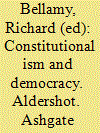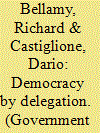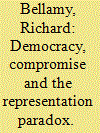|
|
|
Sort Order |
|
|
|
Items / Page
|
|
|
|
|
|
|
| Srl | Item |
| 1 |
ID:
047367


|
|
|
|
|
| Publication |
Cambridge, Cambridge University Press, 2003.
|
| Description |
xi, 754p.
|
| Standard Number |
0521563542
|
|
|
|
|
|
|
|
|
|
|
|
Copies: C:1/I:0,R:0,Q:0
Circulation
| Accession# | Call# | Current Location | Status | Policy | Location |
| 047074 | 320.50904/BAL 047074 | Main | On Shelf | General | |
|
|
|
|
| 2 |
ID:
072501


|
|
|
|
|
| Publication |
Aldershot, Ashgate Publishing House, 2006.
|
| Description |
xlviii,573p.
|
| Standard Number |
0754624684
|
|
|
|
|
|
|
|
|
|
|
|
Copies: C:1/I:0,R:0,Q:0
Circulation
| Accession# | Call# | Current Location | Status | Policy | Location |
| 051380 | 342/BEL 051380 | Main | On Shelf | General | |
|
|
|
|
| 3 |
ID:
102689


|
|
|
| 4 |
ID:
114812


|
|
|
|
|
| Publication |
2012.
|
| Summary/Abstract |
Coalitions are often condemned as undemocratic and unprincipled because of the compromises they involve. Politicians are accused of betraying the commitments they made during the election. Paradoxically, proponents of this view suggest that if compromises are to be made they should be pragmatic and based on policy rather than principle. This article disputes this thesis and defends compromise as both principled and democratic. The first section distinguishes a shallow compromise based on the maximal satisfaction of exogenously defined preferences from a deep compromise resulting from reasoning on principle, and argues it proves impossible to avoid the latter. The second section suggests that the obligation to compromise forms part of the ethos of democracy, whereby citizens must agree despite their disagreements. The third section concludes by showing that while representatives will almost certainly betray their electoral mandate if obliged to make only shallow compromises, they can legitimately engage in deep compromises for their voters when they reason as they do.
|
|
|
|
|
|
|
|
|
|
|
|
|
|
|
|
| 5 |
ID:
029776


|
|
|
|
|
| Publication |
Cambridge, Polity Press, 1987.
|
| Description |
184p.
|
| Standard Number |
0745603092
|
|
|
|
|
|
|
|
|
|
|
|
Copies: C:1/I:0,R:0,Q:0
Circulation
| Accession# | Call# | Current Location | Status | Policy | Location |
| 028001 | 321.8/BOB 028001 | Main | On Shelf | General | |
|
|
|
|
| 6 |
ID:
114805


|
|
|
|
|
| Publication |
2012.
|
| Summary/Abstract |
Compromise is routinely evoked in everyday language and in scholarly debates across the social sciences. Yet, it has been subjected to relatively little systematic study. The introduction to this inter-disciplinary volume addresses the research gap in three steps. First, we offer three reasons for the study of compromise: its empirical omnipresence in politics, its theoretical potential to bridge the rationalist-constructivist divide, and its normative promise to recognize the plurality of society. Second, we introduce different approaches to the coherence, legitimacy and limits of compromise found in the existing explanatory and normative literatures. We discuss why these literatures need to speak to one another, and identify possible applications in empirical research. Third, we conceptualize compromise as one possible solution to a conflict. Distinct from both dissensus and consensus, all compromises share three characteristics: concessions, non-coercion and continued controversy. However, different types of compromise can be distinguished by how mutual, costly and painful concessions are; by whether all forms of coercion are absent; and by the degree to which the relevant parties' grounds for conflict are transformed. We conclude by discussing the challenge and appeal of 'politics as compromise' in plural and complex societies.
|
|
|
|
|
|
|
|
|
|
|
|
|
|
|
|
| 7 |
ID:
102686


|
|
|
|
|
|
|
|